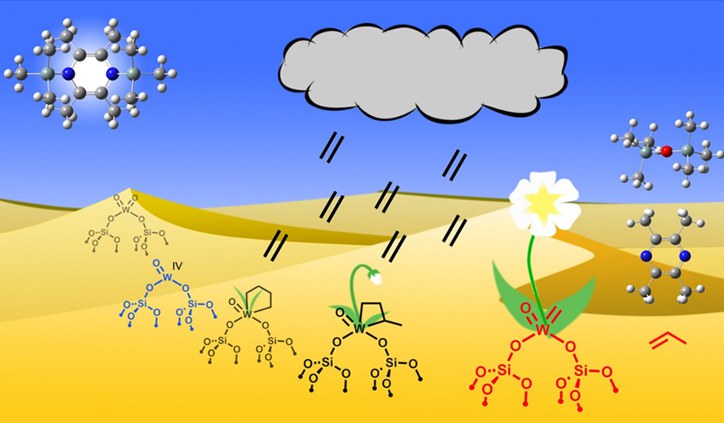Realizing Industrial-scale Alkene Metathesis at Low Temperature
Kazushi MASHIMA, Professor, Graduate School of Engineering Science
Catalyst activation process that facilitates low-temperature alkene metathesis

Realizing Industrial-scale Alkene Metathesis at Low Temperature
Catalyst activation process that facilitates low-temperature alkene metathesis
Alkene metathesis involves the cleavage and formation of carbon–carbon double bonds and is attractive in organic synthesis because it often creates fewer undesired by-products and less hazardous waste than alternative reactions. Alkene metathesis is used industrially for propene synthesis, reforming of petroleum oil, and drug manufacture. In 2005, Yves Chauvin, Robert H. Grubbs, and Richard R. Schrock were awarded the Nobel Prize in Chemistry for their work on alkene metathesis. However, the catalysts used in industrial alkene metathesis only operate at high temperature (>350°C), limiting the scope of this reaction in industrial settings.
An international research collaboration between Osaka University and ETH Zürich in Switzerland recently developed a low-temperature activation process to extend the scope of industrial alkene metathesis.
“We used an organosilicon reductant to activate silica-supported tungsten and molybdenum oxo catalysts, generating a large amount of active species at just 70°C,” says Kazushi Mashima of the Osaka University Graduate School of Engineering Science, Department of Chemistry.
A typical industrial catalyst for alkene metathesis is tungsten trioxide supported on silica. This catalyst requires a high temperature to form the active oxo alkylidene groups needed for alkene metathesis. The researchers developed a way to prepare a silica-supported tungsten oxo catalyst that was active in alkene metathesis at low temperature. First, they fabricated isolated tungsten(VI) oxo surface sites on silica by grafting and heat treatment. Second, the tungsten(VI) oxo surface sites were reduced using an organosilicon reductant, which was chosen to minimize the formation of salts and metal species. The resulting material displayed promising catalytic activity in alkene metathesis, reacting with 1000 equivalents of cis-4-nonene at 70°C in 6 h.
The poisoned catalyst could be reactivated by reaction with the organosilicon reductant.
“The unprecedented reactivation of the poisoned catalyst reveals that it may be suitable for use under flow conditions,” says Christophe Copéret of ETH Zürich.
The researchers then used the organosilicon reductant to activate traditional industrial catalysts for alkene metathesis, achieving promising results. The importance of the teamʼs findings has been noted by Schrock:
“The work by Copéret and Mashima may revolutionize the synthesis and use of inexpensive supported metathesis catalysts for hydrocarbons on an industrial scale by allowing the use of much lower temperatures than currently employed.” [R. R. Schrock, Reducing Them Down To Charge Them Up: Low Temperature Catalyst Activation, ACS Central Science, 2016, 2 (8), 495–496, DOI: 10.1021/acscentsci.6b00223]
The ability to perform alkene metathesis at low temperature on an industrial scale will provide important materials more efficiently and at lower cost.

Professor Kazushi Mashima
Graduate School of Engineering Science
mashima@chem.es.osaka-u.ac.jp
http://www.organomet.chem.es.osaka-u.ac.jp/mashima_homepage/index-Eng.html
Reference:
- Victor Mougel, Ka-Wing Chan, Georges Siddiqi, Kento Kawakita, Haruki Nagae, Hayato Tsurugi, Kazushi Mashima , Olga Safonova, Christophe Coperet, “Low Temperature Activation of Supported Metathesis Catalysts by Organosilicon Reducing Agents,”ACS Cent. Sci. 2016, 2 (8), 569-576. DOI:10.1021/acscentsci.6b00176
This research project was supported by the Osaka University International Joint Research Promotion Program, which aims to further enhance research quality and promote globalization at Osaka University through advanced research with overseas collaborators. Professor Mashima jointly conducted this research with the following researcher: Professor Christophe Copéret, ETH Zürich
Interview held in February 2017
